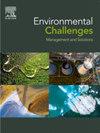Water Hyacinth and fish production in Nigeria: Community Perceptions, Ecological and Economic Impacts, and Willingness to Fund Control
Q2 Environmental Science
引用次数: 0
Abstract
Nigeria’s aquaculture sector, vital for food security and rural livelihoods, is increasingly threatened by the unchecked spread of water hyacinth. This study applied a mixed-methods approach, combining 22 key informant interviews (KIIs), field observations, informal interviews, and a survey of 454 fish farmers to assess its impacts and farmers’ willingness to support control measures. Results show widespread recognition of negative effects, including reduced fish catch, poor water quality, damaged infrastructure, with strong community demand for intervention. On average, households are willing to contribute ₦2492 (USD 1.51) per month for 20 years to finance control measures. Econometric analysis indicates that willingness to pay (WTP) is shaped by the interaction of income and education, as well as gender and regional differences, rather than income alone. While education moderates income to increase WTP, the education–income interaction negatively affects participation. Notably, these contrasting effects on participation (negative) and WTP (positive) can be understood through the lens of collective action theory. These findings emphasize the need to integrate community perceptions with economic valuation to design inclusive and regionally tailored control strategies, strengthening resilience in Nigeria’s aquaculture sector.
尼日利亚的水葫芦和鱼类生产:社区观念、生态和经济影响以及资助控制的意愿
对粮食安全和农村生计至关重要的尼日利亚水产养殖部门日益受到水葫芦不受控制的蔓延的威胁。本研究采用混合方法,结合22个关键信息提供者访谈(KIIs)、实地观察、非正式访谈和对454名养鱼户的调查,以评估其影响和养殖户支持控制措施的意愿。结果表明,人们普遍认识到负面影响,包括渔获量减少、水质差、基础设施受损,社区对干预的需求强烈。平均而言,每个家庭愿意在20年内每月拿出2492奈拉(1.51美元)用于资助控制措施。计量经济学分析表明,支付意愿(WTP)是由收入、教育、性别和地区差异的相互作用形成的,而不仅仅是收入。教育通过调节收入增加劳动收入,但教育与收入的交互作用对劳动参与率产生负向影响。值得注意的是,这些对参与(消极)和WTP(积极)的对比效应可以通过集体行动理论的视角来理解。这些研究结果强调,需要将社区观念与经济评估结合起来,以设计包容性和适合区域的控制战略,加强尼日利亚水产养殖部门的抵御能力。
本文章由计算机程序翻译,如有差异,请以英文原文为准。
求助全文
约1分钟内获得全文
求助全文
来源期刊

Environmental Challenges
Environmental Science-Environmental Engineering
CiteScore
8.00
自引率
0.00%
发文量
249
审稿时长
8 weeks
 求助内容:
求助内容: 应助结果提醒方式:
应助结果提醒方式:


